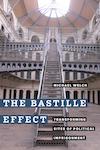 Welch, Michael (2022) The Bastille Effect: Transforming Sites of Political Imprisonment. University of California Press.
Welch, Michael (2022) The Bastille Effect: Transforming Sites of Political Imprisonment. University of California Press.
Buy this book from University of California Press
Summary || Table of Contents || Reviews
 Welch, Michael (2022) The Bastille Effect: Transforming Sites of Political Imprisonment. University of California Press.
Welch, Michael (2022) The Bastille Effect: Transforming Sites of Political Imprisonment. University of California Press.
As conceptualized throughout this richly illustrated book, The Bastille Effect represents the unique ways that former prisons and detention centers are transformed, both physically and culturally. In their afterlives, these sites deliver critiques of political imprisonment and the sustained efforts to hold perpetrators accountable for state violence. However, for that narrative to surface, the sites are cleansed of their profane past, even enlisting clergy to perform purifying rituals that grant them a new place identity as a memorial. For example, at Villa Grimaldi, a former detention and torture center in Santiago, Chile, activists condemn the brutal Pinochet dictatorship by honoring the memory of victims, allowing the space to emerge as a park for peace. Throughout the Southern Cone of Latin America, and elsewhere around the globe, carceral sites have been dramatically repurposed into places of enlightenment that offer inspiring allegories of human rights. Interpreting the complexities of those common threads, this book weaves together a broad range of cultural, interdisciplinary, and critical thought to offer new insights into the study of political imprisonment, collective memory, and post-conflict societies.
Table of Contents
Preface
PART ONE: THE SACRED & THE PROFANE
Chapter 1: Cultural Afterlives
Chapter 2: States of Confinement
PART TWO: IN SEARCH OF SIGNS
Chapter 3: Sites of Trouble
Chapter 4: Sites of Condor
PART THREE: DIAGRAMS OF CONTROL
Chapter 5: Economic Forces
Chapter 6: Catholic Nuances
Chapter 7: Architectural Designs
PART FOUR: TECHNOLOGIES OF POWER
Chapter 8: Censor & Propaganda: Transform the Mind
Chapter 9: Torture & Torment: Transform the Body
Chapter 10: Exterminate & Denial: Transform Society
PART FIVE: PERFORMING MEMORY
Chapter 11: Consecrate & Desecrate
Chapter 12: Places of Resistance
References
"The scholarly work of Michael Welch is recognized for its blend of critical theory and human rights. The Bastille Effect is no exception. With lessons from Northern Ireland, the Southern Cone of Latin America, and other post-conflict societies, the book reveals the terrible depths -- and pains -- of political imprisonment."
-- Kieran McEvoy, Professor, The George J. Mitchell Institute for Global Peace, Security and Justice, Queen's University, Belfast (Northern Ireland)
Informed by his previous critique of torture, Welch expands the significance of human rights to political imprisonment, technologies of power, and the meaning of memory. With compelling case studies, this wide-ranging book adds important cultural relevance to criminology, penology, and law.
-- Professor Diego Zysman Quiros, University of Buenos Aires
By attending to political cultures, scholars are remapping the ways in which criminal justice is understood. Michael Welch's highly original project on the afterlife of sites of political imprisonment throws new critical light onto the politics of punishment and represents an important contribution to the burgeoning study of comparative penality.
-- Professor Tim Newburn, London School of Economics